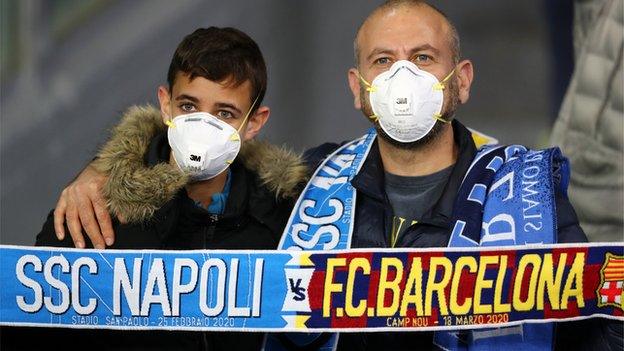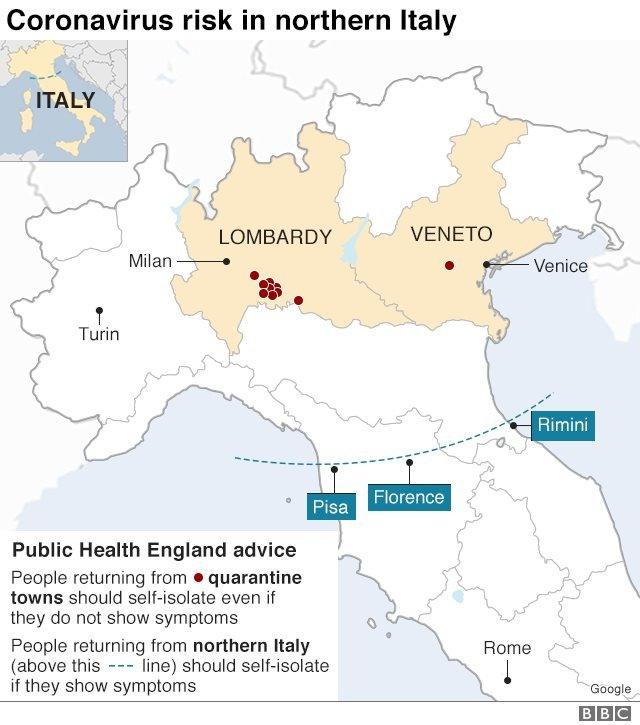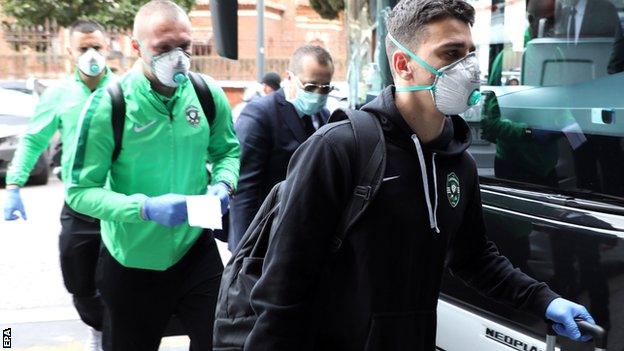Coronavirus: How Italian football is coping with outbreak
- Published

Fans wearing face masks watched Napoli's draw with Barcelona on Tuesday
Lionel Messi made his first ever appearance in Naples on Tuesday, playing in Barcelona's 1-1 draw with Napoli in the Champions League.
But more striking than the Argentina legend's presence, in a stadium where his compatriot Diego Maradona is a club hero, were the masked fans in the stands, taking precautions against coronavirus.
More than 300 people have been infected in Italy, 12 of whom have died. The Venice Carnival has been called off, while the La Scala theatre has been shut down. The Milan stock exchange is falling.
But this is having consequences for Italian football and sport in general.

Last weekend, four Serie A games in Milan, Bergamo, Verona and Turin were suspended and on Saturday, Serie B side Cremonese drove 300 miles to Ascoli, only to be sent home upon arrival.
This weekend, safety measures will hit even harder. A new decree by the Italian government, applying to six regions, means all Serie A games taking place in those territories will be played behind closed doors.
Third-tier football has been suspended, as have rugby, volleyball and basketball leagues.
The consensus among fans, who see Sunday football as an important social activity, is that they will continue to go to games if they are told it is safe, but many are expected to wear masks.
We will see the effect of coronavirus on Thursday night, when Inter Milan take on Ludogorets in the Europa League behind closed doors at the San Siro.
The affect of the outbreak on the Bulgarian team is clearly visible, with Ludogorets players getting off their bus in Milan this week wearing masks and plastic gloves.

Ludogorets players arrived in Milan on Wednesday wearing masks and gloves
The club have even hired an immunologist for the trip to Italy and the question has been raised about whether they will shake hands with their opponents. Is it reasonable or is it all going a bit too far?
But fear is present and the outbreak of the virus is having an impact on clubs.
Both Inter and AC Milan have closed their offices and staff are working from home, in a city where the underground system is eerily quiet and devoid of people.
And some teams have expressed economic concerns about playing behind closed doors. No fans means no profits from ticket sales.
Juventus, for instance, always have a full house at the Allianz Stadium, which brought them 74m euros (£62m) in revenue during the 2018-19 season - 53m (£45m) of which came from matchdays.
Clubs have not been forced to play behind closed doors, with other options available.
"Clubs could have also suspended games and postpone them, but there are scheduling issues," said the Italian minister of sports Vincenzo Spadafora.
"Unfortunately, this is nothing I can evaluate or decide for."
What about fans who bought tickets? Clubs deal with this matter according to their own regulations
Inter will refund, external those who bought a ticket for their Europa League game, but Juventus will reportedly not refund any tickets, external - even season ticket holders - for the Derby d'Italia against the Bianconeri, due to take place in an empty stadium on Sunday night in Turin.
The last time the two clubs faced each other at the Allianz Stadium, Juventus announced revenues of 3.1m euros (£2.6m). The figure would have been similar on Sunday, and Juventus are permitted to keep the money, regardless of the whether it is deemed fair for fans.
The situation is so unprecedented that Sky Italia had declared themselves ready to broadcast the game on their free-to-air channel TV8, essentially giving away a match that is the biggest asset of the season for them. Ridiculously, they were unable to fulfil the gesture because they only own the pay TV rights.
Nevertheless, the show must go on and playing behind closed doors is a compromise that must suffice.
The two real issues battling each other are the health of the public and fixture scheduling.
"If the situation degenerates to a certain point, it wouldn't be a heresy to suspend the league completely," former Italy team doctor Enrico Castellazzi said.
For some clubs it would not be a problem to suspend and reschedule, for some others it would.
Last Sunday's Inter against Sampdoria game was suspended and if Antonio Conte's men are to go all the way to the Coppa Italia and Europa League finals, it can only be made up for on 20 May, four days before the final Serie A game of the season.
The alternative of postponing their Coppa Italia semi-final second leg against Napoli would lead to the final being rescheduled too.
In a logistical domino effect, that would not allow the Coppa Italia final venue - Stadio Olimpico in Rome - to be at Uefa's disposal by 15 May, as requested by European football's governing body, to prepare it for Euro 2020's opener.
And that is the next issue. Four Euro 2020 games are due to take place in Rome this summer. But who can predict how the situation will evolve in the next weeks and months?